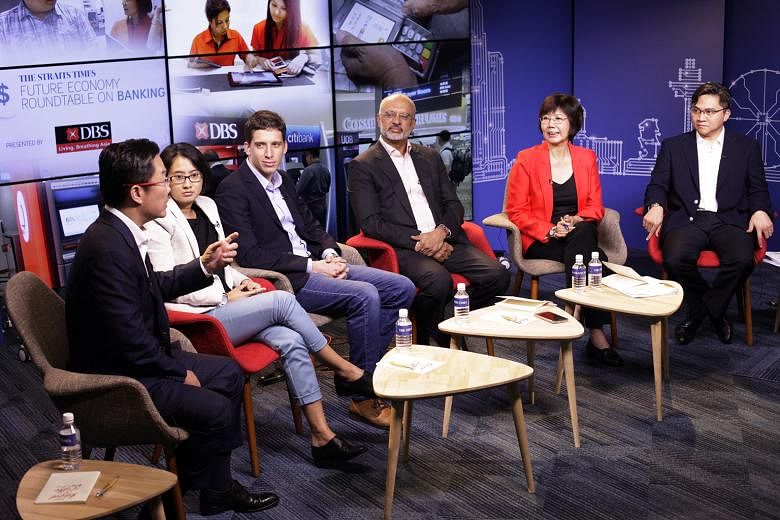Blockchain, crowdfunding and robo-advisers. These are some of the terms in the brave new world of banking that comes with jargon of its own.
Fed up with poor stock tips from your remisier? A robo-adviser can give you unbiased advice - for half the fee. Shocked that the bank manager has rejected your loan application for a business? For a small and medium-sized enterprise, funds from complete strangers are just a few clicks away with a crowdfunding request.
Accustomed to calling your foreign-exchange trader for a quote on the Sing-US dollar exchange rate to price your sales contract? The "electronification" of foreign currency trading is changing all that.
These changes include blockchain, hailed as a revolutionary 21st-century technology that will change the face of world trade.
It is a digital ledger where users make and verify transactions instantaneously on a network, without a central authority.
Currently, trade financing works through a cumbersome letters-of- credit system with guarantees provided by a bank.
SMALL CAN BE BEAUTIFUL
For DBS Group Holdings chief executive officer Piyush Gupta, Singapore's relatively small size is no hurdle to success.
The focus previously was in bringing multinationals and their investments into Singapore.
He says: "As we go forward, we have to switch from a GDP (gross domestic product)-focused strategy to a GNP (gross national product)-focused strategy, which includes what Singapore companies can do in terms of value creation outside our geographical borders."
After all, the business generated here is constrained by Singapore's size.
Mr Gupta notes: "If Singapore Airlines is operating around the world, does that benefit Singapore?
"Yes, because you have shareholders here, you have employees here, you have the intellectual property over here and the headquarters."
Ditto with DBS, which is expanding in China and India. He adds: "That does not mean (the expansion) is to the exclusion of benefit to Singapore and Singaporeans. As our headquarters grows, we add people over here, we create jobs over here as we expand into the region."
What else does Singapore have going for it? Being a nation-state.
Mr Gupta says: "It's the capacity of the regulators, the Government, the public sector, the infrastructure to come together, where you have elements of strong KYC (Know Your Customer) regimes, strong data privacy, where efficiency is in services and you do that as a complete nation."
On the market-infrastructure aspect, this is where government agencies like the Monetary Authority of Singapore (MAS) come in to strengthen connectivity and enhance access to the rest of Asia.
As Mr Leong Sing Chiong, MAS' assistant managing director of the development and international group, puts it, "It's not just about building the roads to connect, but also getting the traffic to flow".
For example, the push to achieve increased use of electronic trading in Singapore's foreign-exchange markets - already the largest in Asia - is to ensure the best execution of forex transactions. "This keeps Singapore relevant as a purposeful financial centre," he says.
Another example of improving market access is to make sure that Singapore is easily connected with other cities in terms of funds flow.
Recently, Singapore banks inked several financing deals in China's south-western city of Chongqing that will facilitate trade and investment between the two parties.
As at June this year, Singapore's financial sector was part of around US$4.5 billion (S$6 billion) in deals for Chongqing companies, including the issue by Chongqing Grain of its first yuan-denominated Lion City bond in Singapore.
These are examples of how Singapore's strength as a trusted brand in a volatile environment is able to be used to achieve this connectivity, notes Singapore Management University (SMU) finance professor Annie Koh.
SINGAPORE'S FUTURE AS A HUB
Being able to pull every party together to get things done fast remains Singapore's strength.
Prof Koh cites a blockchain example. It is unlikely, in the global scheme of things, that Singapore will be driving blockchain protocol.
She says: "But we can use blockchain to completely change the way we trade, from Customs to the port, from payments to the freight forwarders, with trade and supply-chain financing leveraging on technology to reimagine trade."
Referring to the National Trade Platform, an initiative in this year's Budget enabling more sharing of integrated electronic trade data between businesses and the Government, Prof Koh argues that if this can be pulled off, it could be expanded to the Asean Economic Community - whose thrust is regional economic integration - and even the Trans-Pacific Partnership.
"Singapore can become the trade brain hub, where manufacturing is done elsewhere but the trade finance and trade analytics part can be done here," she adds.
There is also potential in being able to create a set of rules in the collection and use of data that will enable banks to deliver greater benefits to customers while boosting trust in the banking system, argues Mr Gupta. Under the new KYC environment, "we have all the data for everyone. Immigration, telcos, banks, insurance companies collect data. If you can use the data in an intelligent way, this could be a real opportunity", Mr Gupta says.
On the financing front, there is scope to further enhance Singapore's position as a financing hub.
Mr Leong points out that the private equity and venture capital sector has been growing at around 30 per cent annually over the last five years. He says: "There is a great opportunity to see how we can leverage on the funds coming in here and be a magnet for the next-generation Asian growth companies to come into Singapore to raise financing."
OF SANDBOXES AND 'NEW GOOGLES'
While Singapore clearly has an advantage in being a hub, should it also put resources into creating the next Google or financial giant?
The conditions exist to facilitate it. Fostering financial innovation is certainly one of MAS' priorities.
Mr Leong says: "We are constantly looking out for good ideas - be they big, small, localised, regional or even global.
"That's why we have put in place co-funding schemes and also introduced the regulatory 'sandbox', where new ideas can be tested within a controlled framework with the necessary safeguards.
"Should ideas fail, they can fail fast and fail cheaply."
Whether a "new DBS" or "new Google" will emerge remains to be seen.
Maybank's head of foreign exchange research, Mr Saktiandi Supaat, is cautious.
He points out that banks have been one of the few sectors that have been highly innovative in the last 20 years, with the introduction of ATMs and credit cards.
He raises the question of whether Singapore has sufficient talent to innovate, even within the banking system, to come up with new ideas and new products for changing consumer behaviour and expectations.
For Mr Gupta, innovation is important, but execution more so.
He says: "It's how you execute and scale to commercialise it.
"Look at (Chinese e-commerce giant) Alibaba. Alibaba didn't have any original ideas but was able to take ideas and make them relevant to the China market and execute those ideas.
"So I won't pay short shrift to the value of success transfer, finding ideas from elsewhere that could work in South-east Asia."
Mr Pawel Kuznicki, founder of Capital Match - a crowdfunding platform that helps businesses borrow from retail investors - agrees, saying that Singapore's efforts should be directed more at creating a supportive ecosystem.
-
Finance sector facts
The financial sector grew by 5.3 per cent last year, compared with overall gross domestic product growth of 2 per cent.
The sector's growth has consistently outpaced that of the overall economy. But this year, financial services and overall economic growth will be closer, amid the latter's slowdown.
Assets under management posted a 9 per cent increase to reach $2.6 trillion last year.
Last year, the financial services sector created a net total of 4,500 jobs, with a shift towards front office and higher value-added jobs.
TAKING THE PLUNGE
Despite the upbeat talk, all plans are moot without the appropriate people.
Mr Saktiandi says while there are opportunities, the question is whether the skill sets in Singapore are sufficient to meet these demands.
That is something that Mr Gupta agrees will be one of the biggest issues in the future of banking.
He says: "A lot of old jobs of the old world - call-centre operator, tellers, backroom operations people - will be far fewer."
However, he is confident some reskilling can be achieved. At DBS, Mr Gupta is conscious of trying to make people more digitally aware, of getting them to think of the "customer journey".
This can be achieved by, for example, hackathons - putting executives in small groups and giving them a business challenge to solve quickly - to broaden their thinking.
Mr Gupta says having more entrepreneurship in Singapore will be the way that a workforce can be absorbed in a world where typical old-fashioned jobs are disappearing.
-
PANELLISTS
PIYUSH GUPTA, chief executive officer of DBS Group Holdings
LEONG SING CHIONG, assistant managing director of the development and international group at the Monetary Authority of Singapore
ANNIE KOH, professor of finance at Singapore Management University
PAWEL KUZNICKI, founder and chief executive officer of Capital Match
SAKTIANDI SUPAAT, head of foreign exchange research at Maybank Singapore
YASMINE YAHYA, Assistant Business Editor at The Straits Times
MODERATOR
LEE SU SHYAN, Business Editor at The Straits Times
But in Singapore, "how do you create an entrepreneurial and risk-taking environment and foster risk-taking skills?" he asks.
"That comes from giving people the chance to make mistakes, from experimenting and not always frowning on failures."
Given the contribution of the financial sector to the overall economy - at about 12 per cent of GDP - much is at stake.
For MAS, Mr Leong says it is critical that Singapore continues to stay relevant by providing a strong business and regulatory environment that best meets the needs of financial institutions, even as their business models are changing rapidly.
Increasingly, there is also a clear recognition that MAS has to work closely with the industry to keep pace with all the changes "and achieve sound and sustainable growth in a complex and uncertain world", he says.
Prof Koh says: "Technology is making us rethink - this is a healthy direction to take.
"It's not that the bank is no longer relevant, it's just that banking services are changing.
"If we see this holistically... Singapore has massive opportunities to deliver superior value, better than any other financial centre".



